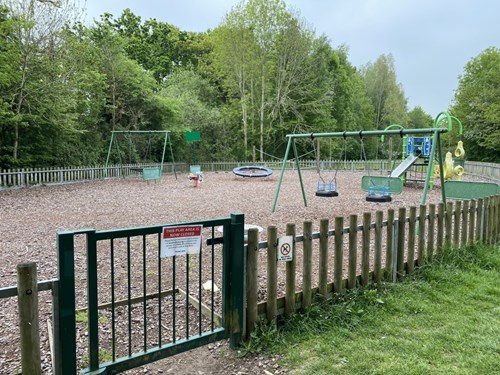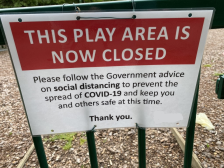COVID–19 and Children’s Playgrounds
Publicly accessible playgrounds and outdoor fitness gyms need their regular safety checks to be continued.
HMG’s first issued closing instructions specifically mentioning such publicly accessible recreation and leisure
facilities on 23rd March, “close all shops selling non-essential goods, including clothing and electronic stores and
other premises including libraries, playgrounds and outdoor gyms, and places of worship;”. This was continued
on 11th May “You will still not be able to use areas like playgrounds, outdoor gyms or ticketed outdoor leisure
venues, where there is a higher risk of close contact and touching surfaces.”
The closure of fenced kids playgrounds may initially be viewed as undertaken easily by the closure of its gates, and for unfenced sites, the removal or securing of moving items, and taping off of other items, all with the provision of appropriate notices. Such facilities are provided as and are seen by children and young people, as an allurement, particularly to those seeking freedom from their ‘lockdown’ home in what they may regard as their adult free safe space.

However, the provision of notices, taping off of items, zip locking or padlocking of access gates and equipment such as swings is advised to be insufficient to prevent access and consequently some form of use. Indeed, the often observed securing of items, for example, swings by padlocking them together can produce new hazardous situations to children deciding to climb, having created moving entrapment points in the now ‘V’ joined swing chains and seats. Surrounding items such as outdoor gym fitness equipment with security ‘herras’ fencing can provide a solution however continuing care on its stability and removal of sharp edges and puncture points is necessary to address the access efforts made by potential users.
Such recreational and leisure equipment, in particular playground equipment, should be expected to be accessed and used, as children even if they are able to read a provided notice, are considered to not necessarily have fully comprehended its meaning. Indeed, children often take against the denial of ‘their’ area, and in consequence, deliberately choose to explore and use it. Children, used to their conquered climbing frames seen through the playground fence, can be expected to view a fence or gate as a new challenge, great care needs to be taken to ensure that such items do not in themselves create hazards such as head and neck entrapments found in some designs.
In addition to any moral considerations, such facilities are covered by the Health and Safety at work act 1974 and its implementing regulations, as such, unless access to the facilities can be completely prevented, the regular safety inspections for matters such as vandalism/litter/defective parts need to continue, as the use of the facilities is highly unlikely to completely stop.
Implementing the closure instruction and maintaining the ongoing safety of the facility is therefore fraught with considering the detail. As such closure, even of fenced areas, should not be viewed by providers as an opportunity to cease or drastically reduce the site and equipment safety inspections as provided within the UK national recommendations, British Standard BS EN 1176:2017.
An article signed by our IEW expert in children’s playground facilities,
Jean Wenger.
If you have any questions regarding kid's playgrounds and outdoor fitness gym equipment or if you need expert witness advice on a case, please do not hesitate to contact our Expert Witnesses on 0117 986 2194 or at enquiries@iew.org.uk.
Back to News

